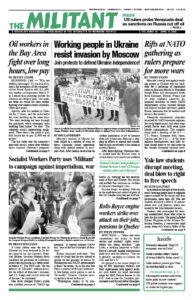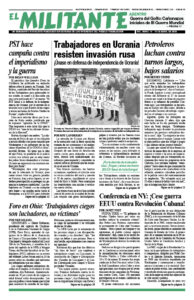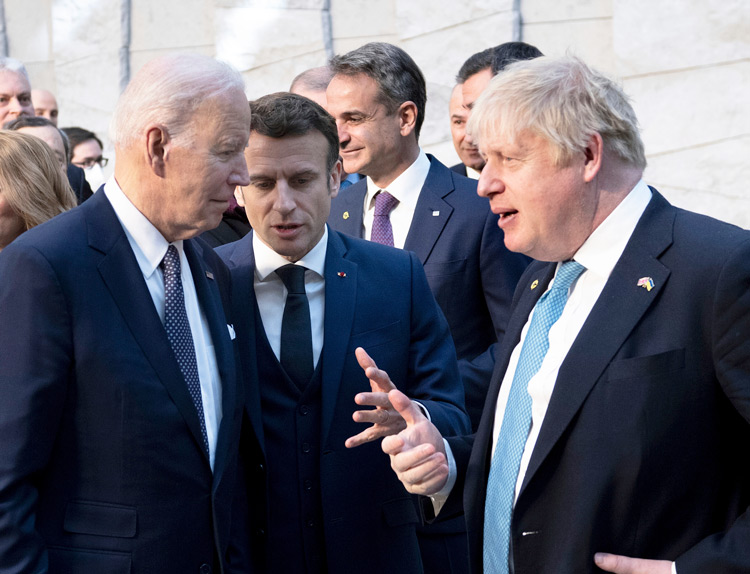Moscow’s deadly war against working people in Ukraine was the backdrop for a gathering of imperialist rulers in Brussels March 24. President Joseph Biden and government heads from Germany, Britain, France and 26 other capitalist countries announced decisions to boost NATO deployments across Eastern Europe and impose harsher sanctions against Russia, measures that hit workers and farmers the hardest.
Alongside rearmament programs launched by NATO-member regimes, the troop deployments and other steps herald future wars with even more bloody consequences. The summit, along with a meeting of the G-7 — U.S., France, Germany, Italy, Japan, Canada and the U.K. — in the same military headquarters, was held behind closed doors to try and cover up the sharply divergent national interests among the rival powers under the cloak of unity around Ukraine.
For decades imperialist powers in Europe have been utterly dependent upon Washington’s ground, air, naval and nuclear forces to deal blows to uprisings by workers and farmers worldwide. And they depend on them to take on the newly emerging capitalist class in Russia that was born during the “shock therapy” privatization of the Russian economy by the U.S. rulers and former Soviet officials after the collapse of the Soviet Union in 1991.
Since Moscow’s invasion of Ukraine, NATO has readied 140,000 troops in Europe. Some 100,000 of these are U.S. troops.
NATO was founded in 1949, as Washington emerged the victor out of the ashes of the second imperialist world war as the victor. Between 70 million and 85 million people, over 3% of the world’s population, were killed in that slaughter. Since its founding, NATO has been presented as a way to keep the peace in Europe and beyond, alongside other multinational institutions like the European Union and its forerunners.
In fact NATO was always a tool to crush rebellions by workers and farmers, police the world and ensure the U.S. rulers’ dominant position in Europe. Washington fought its 1950-53 carpet bombing and ground war against the people of Korea.
Today the U.S. rulers are still trying to put together a regional alliance to join in countering China’s challenge to Washington’s post-World War II dominance in Asia.
Nuclear threats
Following Moscow’s announcement that it was placing its nuclear arms on ready alert after invading Ukraine, the Biden administration chose the day of the NATO summit to reiterate the U.S. rulers’ longstanding policy that their use of nuclear weapons was not restricted, but could be used in any conflicts they chose. Washington has vast stockpiles of nuclear weapons that threaten humanity’s existence, with some deployed in Belgium, Germany, Italy, the Netherlands and Turkey.
Moscow’s invasion of Ukraine, seeking to put it under the thumb of Russia’s rulers, is a stark reminder that the capitalist system, driven to expand and smash competition, always contains the threat of new wars.
Capitalist powers across Europe are beefing up their militaries. Governments in Germany, Belgium, Italy, Poland, Norway and Sweden, as well as Australia, have all announced increases in war spending. Biden said U.S. war spending will rise up to $813 billion over the next year. This is more than the gross domestic product of the vast majority of countries in the world.
At the end of the summit, Biden claimed NATO has “never, never been more united.” But within hours many of the same governments failed to agree on a new package of sanctions targeting Russia. The rulers in Germany get 55% of their natural gas, 50% of their coal and 35% of their oil from Russia. They refuse to back more sanctions that target the source of these supplies, saying they’ll end imports of Russian oil down the road, as they scramble to find alternative markets at acceptable prices.
Here, as in all matters, each country’s capitalist ruling families are searching for how they can best protect their predatory reach and profit-making potential. Most still see no other way to do so except under Washington’s umbrella, but they chafe at being under its thumb. Some increasingly look to deals with Beijing, the rapidly rising economic powerhouse today. The real trend is not toward unity and peace, but greater inter-capitalist friction and conflicts, which have deep-seated roots.
“The underlying contradictions of world capitalism pushing toward depression and war did not begin on September 11, 2001,” writes Socialist Workers Party National Secretary Jack Barnes in “Capitalism’s Long Hot Winter Has Begun,” printed in New International no. 12. “Some were accelerated by those events, but all have their roots in the downward curve of capitalist development a quarter century ago, followed by the interrelated weakening and then collapse of the Stalinist apparatuses in the Soviet Union and Eastern and Central Europe at the opening of the 1990s. … One of capitalism’s infrequent long winters has begun. With the accompanying acceleration of imperialism’s drive toward war, it’s going to be a long, hot winter.”
The NATO meeting showcased rapidly changing relations between the rulers of Poland and other capitalist powers. For years the Polish government was decried as a “far-right” danger and threatened with all kinds of sanctions by sanctimonious “democratic” regimes in Western Europe. Biden condemned the Polish government as a “totalitarian regime” in 2020. Today Poland is lionized by the same governments as a crucial staging post for shipping arms and fuel from the U.S. and Europe to Ukraine.
Moscow’s invasion of Ukraine has also been accompanied by continuing friction between Washington and Beijing. The Chinese government supports Putin’s justifications for its Ukraine invasion, while carefully guarding its own economic and military interests.
Talks are underway between Beijing and the government of the Solomon Islands, strategically located northeast of Australia in the South Pacific, that could lead to the Chinese rulers establishing a key naval base there. For decades the Solomon Islands’ government had been allied with the rulers in Australia. The U.S. and Australian rulers have been more closely integrating their military forces in recent months. And the government in Canberra announced plans this month to rapidly expand its military.


